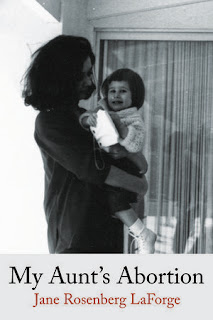Jane Rosenberg LaForge is the author of the new book My Aunt's Abortion, a series of poems and essays. Her other books include the novel Sisterhood of the Infamous, and her work has appeared in a variety of publications, including Poetry Quarterly and Wilderness House Literary Review. She lives in New York City.
Q: What inspired you to write My Aunt's Abortion?
A: A few things: A decade's worth--or possibly more--of anti-abortion legislation inspired me to write the book. And in 1989 my mother told me specifically that my aunt had an illegal abortion.
It took a long time for all the pieces of my family history--the abortion, my mother's illness, my parents' divorce--to come together. (There were many other events that intervened.) My sister died, then both my parents died; my aunt died; and Republicans introduced more legislation to curtail access to abortion.
One thing that keeps me writing is the idea that I'm creating a record for my daughter to go through one day. When it became clear Roe v. Wade was going to be decimated, I wanted to make sure my thoughts were in one place.
Q: In the book, you write, "What we might not yet understand is how the consequences of illegal abortion extend beyond the person who may or may not survive the procedure. But if my family’s experience is any indicator, we might soon find out how vast and pernicious the lack of real abortion options is." Can you say more about what you see looking ahead now that Roe v. Wade has been overturned?
A: In the book's opening essay, I note that legal experts aren't quite sure themselves how everything will work out. Of course we already know that abortion will be safe and accessible for those who have money and means, and for those who don't, abortion will be costly and dangerous.
But what will happen to children whose relatives have illegal abortions? What will happen to marriages where an abortion becomes an issue, even though neither party is undergoing an abortion themselves? That I can't predict.
But when you surround a family in shame, even remotely, it can't be good. There will be lots of shame in criminalizing abortion, or forcing people to travel to other states to get one. Shame usually means secrets, and when secrets come out, there is always a reckoning.
Q: How did you decide on the order in which the poems and essays would appear in the collection?
A: I tried to organize the poems chronologically, in the sense that first, here are the living arrangements, here are the characters, and this is how they work. What happened next? Someone got pregnant, someone needed an abortion, and then there was all this fuss about the arrangements and arguments, who would pay, what were their expectations, and what actually happened.
In organizing the poems chronologically, I had some of my own realizations about what my parents' marriage was all about, what cracked it open, why it could not be repaired. Those realizations led to other poems, and also helped me to organize things.
In a way I'm telling the same story over and over again in the chronology, so that you're never quite free of the events; so you know there's no easy resolution.
Q: What do you hope readers take away from the book?
A: I hope they realize that abortion is a private matter, and if someone has an abortion, or needs one, or wants one, it doesn't have much to do with you or your life.
If you make abortion a public matter; if you take it out of the realm of one person's private life and make it something people can comment on, stoke resentments over, make judgments and decisions, then you're really playing with fire. You don't know who will get burned. You don't know how far the implications will reverberate.
Q: What are you working on now?
A: I'm always writing poetry, and I'm trying to write a novel about my experiences as a journalist. I never know if I'll finish something until it's finished, so here's hoping I get to the end of it.
Q: Anything else we should know?
A: I'm not trying to foster debate with this book. I'm not arguing that abortion is a good thing, or that adoption is the solution, or that a fetus does or doesn't have rights. I'm simply saying, this is what illegal abortion looks like. It didn't look so good when it came to my family. Readers can take it from there.
--Interview with Deborah Kalb


No comments:
Post a Comment